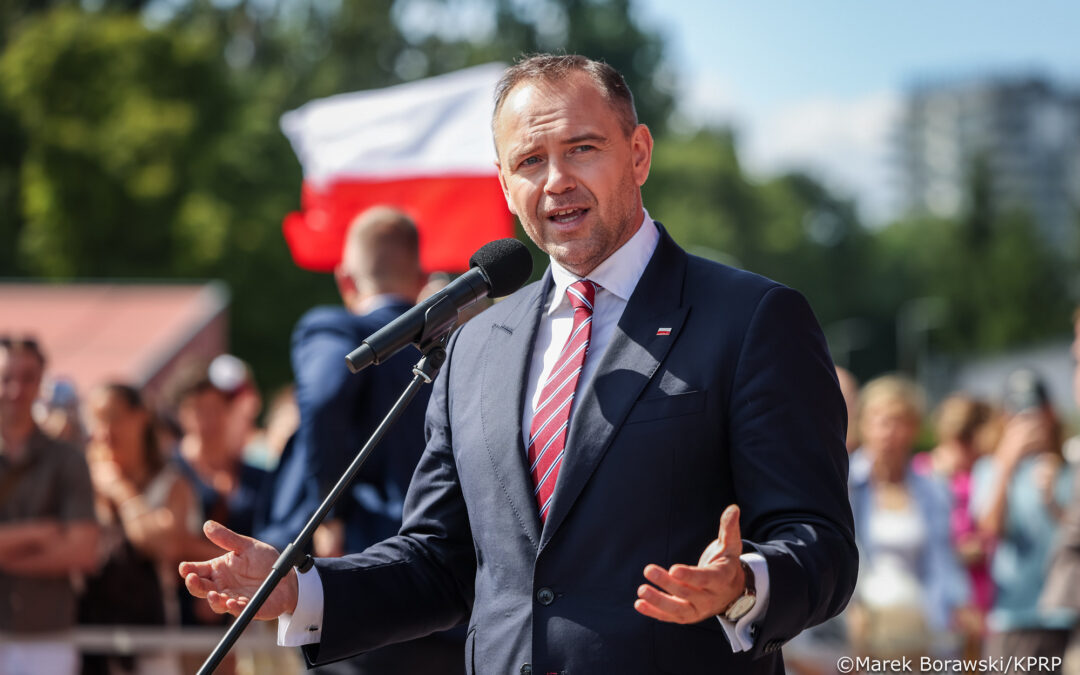Keep our news free from ads and paywalls by making a donation to support our work!

Notes from Poland is run by a small editorial team and is published by an independent, non-profit foundation that is funded through donations from our readers. We cannot do what we do without your support.
Opposition-aligned President Karol Nawrocki has vetoed two government bills intended to bring Poland in line with European Union regulations, one on gas reserves stored abroad and another on electronic records of pesticides used by farmers.
Since taking office three weeks ago, the conservative president has now vetoed six bills passed by the more liberal and pro-EU ruling coalition, which ranges from left to centre-right.
Kolejne ustawy z decyzją Prezydenta RP @NawrockiKn:
Weto do nowelizacji ustawy o zapasach ropy naftowej, produktów naftowych i gazu ziemnego: https://t.co/uvtF5N5idi
Weto do nowelizacji ustawy o środkach ochrony roślin: https://t.co/Ti4wtMZlyY
Ustawy z podpisem… pic.twitter.com/FmrxZGr90j
— Kancelaria Prezydenta RP (@prezydentpl) August 27, 2025
One of the newly vetoed bills would have amended regulations on gas reserves stored outside of Poland in order to remove inconsistencies with EU laws.
The changes included introducing a requirement for the appropriate minister’s consent for the storage of mandatory gas reserves abroad. It also extended to 50 days, from the current 40, the time allowed to transfer such reserves to Poland if required.
The bill also stripped the requirement to set aside transmission capacity for the delivery of all mandatory reserves to Poland in the event of a crisis.
In the justification for his veto, Nawrocki stated that the proposed changes are insufficient to ensure national energy security.
However, the government’s energy minister, Miłosz Motyka, argued that it is in fact the president who has delivered “a blow to Poland’s energy security and the interests of businesses”.
“The government bill increased the security of natural gas supplies,” wrote Motyka on X. “The veto has consequences opposite to those intended – it will actually reduce the level of our gas security.”
“The president has once again demonstrated his lack of understanding of the needs of security, industry and the economy,” he added.
Weto prezydenta do ustawy o zapasach ropy i gazu to uderzenie w bezpieczeństwo energetyczne Polski 🇵🇱 i interesy przedsiębiorców.
Rządowy projekt przygotowany jeszcze przez Ministerstwo Przemysłu zwiększał bezpieczeństwo dostaw gazu ziemnego m. in. poprzez uzależnienie…
— Miłosz Motyka (@motykamilosz) August 27, 2025
The second vetoed bill was meant to introduce an obligation for farmers to keep electronic records of the plant protection products they use, as required by the EU.
However, according to the president, the changes are unjustified and would violate the principles of proportionality, equality before the law, and the obligation to protect consumers.
In his justification for the veto, Nawrocki said that the proposed measures would be “another administrative burden introduced for farms” and that they have already “raised many doubts and reservations among farmers (especially older ones)”.
Poland's new president has presented two more bills for consideration by parliament.
One would end tax on income of up to 140,000 zloty (€33,015) a year for a parent of two or more children.
The other seeks to protect Polish farmers from foreign imports https://t.co/k1MEV3rcIX
— Notes from Poland 🇵🇱 (@notesfrompoland) August 10, 2025
The president also argued that the “system being developed is overly complicated and does not take into account the structure and complexity of Polish agriculture”. He warned that it could threaten “digitally excluded farmers” who have limited access to the internet or lack the necessary technical skills.
But Nawrocki’s decision was criticised by deputy prime minister Władysław Kosiniak-Kamysz, who is the leader of the agrarian Polish People’s Party (PSL). He said the veto would “harm Polish farmers”.
Kosiniak-Kamysz claimed that bill was aimed at protecting the interests of small farms at risk of digital exclusion, as it postponed the obligation to keep electronic records of plant protection products for up to ten years for some farmers.
Polityka liberum veto prezydenta Nawrockiego tym razem zaszkodziła polskim rolnikom.
Rządowa ustawa o środkach ochrony roślin zabezpieczała interes małych gospodarstw i rolników narażonych na wykluczenie cyfrowe odraczając wejście w życie obowiązkowego prowadzenia przez nich…
— Władysław Kosiniak-Kamysz (@KosiniakKamysz) August 27, 2025
Nawrocki, whose presidential campaign was supported by the opposition Law and Justice (PiS) party, has regularly clashed with the government since taking office in early August.
Last week, he issued his first veto since becoming president, against a bill easing rules on building onshore wind turbines and freezing electricity prices for households. However, at the same time, he presented his own bill on price freezes that was identical to the measures included in the wind turbine bill.
This week, Nawrocki also vetoed a government bill extending various forms of assistance and protection for Ukrainian refugees in Poland. He argued that it unfairly “privileged” foreigners over Poles.
The president then submitted to parliament his own legislation that would only allow Ukrainians to receive benefits if they are working and paying taxes, while also criminalising promotion of the ideology of historical Ukrainian nationalist leader Stepan Bandera.
President Nawrocki has submitted his own bill on extending support for Ukrainian refugees to replace the one he vetoed.
It would make benefits conditional on employment and criminalise propagating the Ukrainian nationalist ideology of Stepan Bandera https://t.co/harYLw1M5Q
— Notes from Poland 🇵🇱 (@notesfrompoland) August 26, 2025

Notes from Poland is run by a small editorial team and published by an independent, non-profit foundation that is funded through donations from our readers. We cannot do what we do without your support.
Main image credit: Marek Borawski/KPRP

Agnieszka Wądołowska is deputy editor-in-chief of Notes from Poland. She is a member of the European Press Prize’s preparatory committee. She was 2022 Fellow at the Entrepreneurial Journalism Creators Program at City University of New York. In 2024, she graduated from the Advanced Leadership Programme for Top Talents at the Center for Leadership. She has previously contributed to Gazeta Wyborcza, Wysokie Obcasy and Duży Format.



















